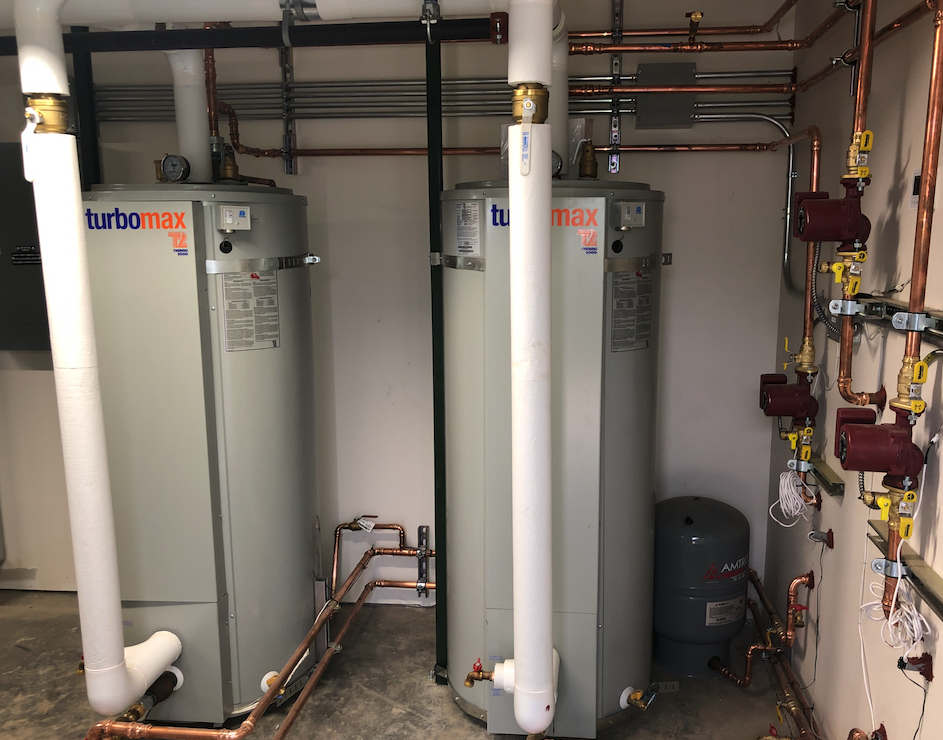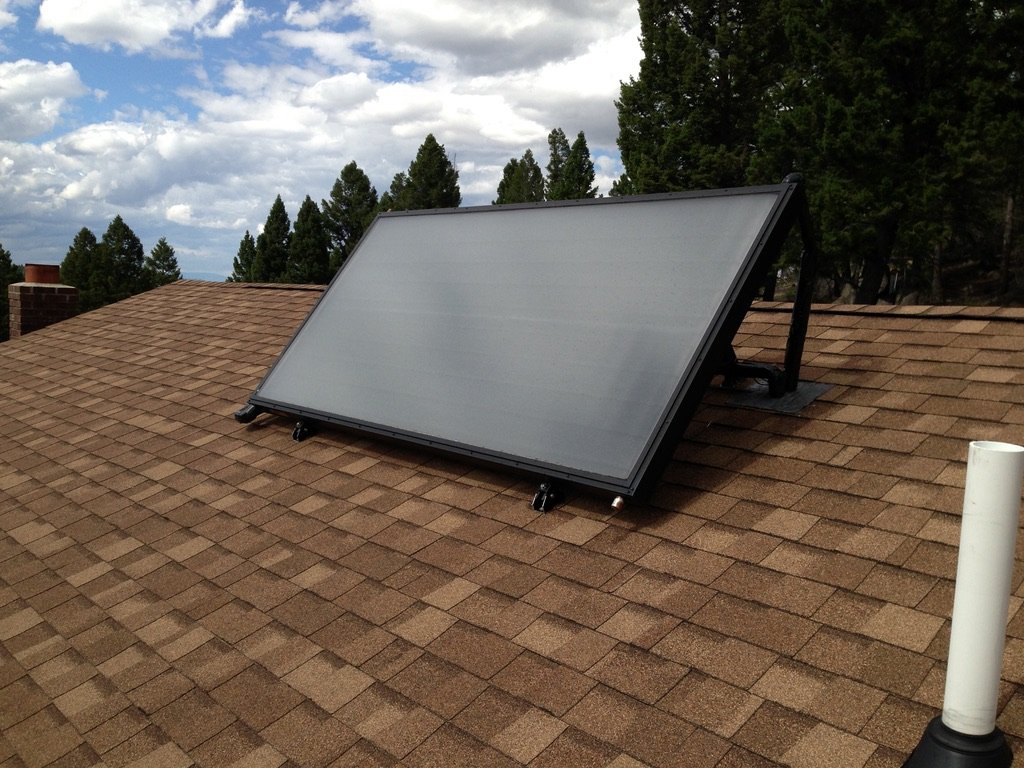
RESIDENTIAL WATER HEATING
For 20 years Liquid Solar has been designing & installing innovative/efficient residential water heating systems.
CHOOSING AN EFFICIENT WATER HEATER
Many plumbers, builders, and architects default to the least efficient, lowest-cost water heaters—especially in older homes or new builds. But better options exist.
Below are smarter, high-efficiency choices for both new construction and existing homes.
🔍 Scroll to the bottom for a quick comparison chart of pros/cons.
NEW CONSTRUCTION
Designing a home from scratch gives you more options. Our top recommendations:
Heat Pump Water Heater
The most efficient choice—ideal for all-electric homes, and still a strong option even with gas or propane.
Electric Tankless
Good for small spaces, ADUs, or intermittent use.
Marathon Electric Tank + Solar PV
Great for homes with solar PV or all-electric systems. Long-lasting, super-insulated tanks.
Combo System (Heat Pump + Booster)
Great for homes with solar PV or all-electric systems. Long-lasting, super-insulated tanks.
High-Efficiency Gas Tankless
Best gas option. For homes with high-efficiency gas boilers, consider an indirect tank (a.k.a. water-maker).
Solar Hot Water (Thermal)
Best for high-demand homes or where heat pumps/solar PV aren’t feasible.
EXISTING HOMES
More constraints—but still efficient options. Your best choice depends on:
Fuel type, space, budget, performance needs, reliability, and availability.
Use the chart below to match your current system with the best upgrade.
💡 Tip: Don’t wait until your old water heater fails—plan ahead to keep all options open.
WATER HEATER COMPARISON CHART - CLICK IMAGE TO ENLARGE
EFFICIENT RESIDENTIAL WATER HEATERS
Heat Pump Water Heater
The most efficient choice—ideal for all-electric homes, and still a strong option even with gas or propane.
-
Pros
Uses 75% less energy than an electric water heater and 85% less than a gas water heater
Reliable, proven technology
Available in 50, 65 and 80 gallon sizes
Very D-I-Y friendly
May qualify for federal tax credits. City of Bozeman offers $500 tax credit.
Stiebel brand (our preferred) only requires 15 amp breaker; others 30 amps.
Cons
Not a good choice in small closet or small space (need at least 50-100 square feet; unless ducted).
Not recommended for high hot water demand (although increasing storage volume/# tanks may work).
Older model were noisy; new ones much better (the new Rheem is only as 48 decibels).
Some plumbers will claim “they don’t work” (wrong) and will not want to install.
They are taller than a standard electric water heater of the same tank volume.
-
Installed cost: $2,500 to $4,000+ (not including tax credits). DIY source from Lowes for $1,500+
Preferred brand: Steibel-Eltron Accelera series; Bradford White Aerotherm series are our current preferred. But all brands are constantly improving.
Other brands like AO Smith, LG, Rheem seem good too.
Marathon Electric Tank + Solar PV
Great for homes with solar PV or all-electric systems. Long-lasting, super-insulated tanks.
-
Pros
Basic electric water heaters are low cost and >95% efficient.
Add enough solar PV to cover usage of water heater and eliminate water heating costs.
Cons
Uses 3-4 times as much energy as a heat pump water heater.
-
Standard 50-gallon electric tank is $500 (not including install) (30 amp breaker)
A MUCH better electric tank is the Marathon (by Rheem): they are non- metallic (will never corrode) and very well insulated: $1500 for a 50g and they have a “stubby” (low and wide) shown in pic above.
High-Efficiency Gas Tankless
The most efficient gas water heater if the high efficiency versions is chosen.
-
Pros
High hot water production if sized properly.
Efficient: 80% to 95% (depending on model chosen).
No standby energy loss from a tank.
Compact
Reliable and proven.
Many plumbers will install.
Cons
Requires venting and gas lines (unlike electric)
If hard water requires annual maintenance or hard water treatment system.
-
Rinnai and Navian are two of the best brands. Rheem is good too.
The lowest cost ($800 online) are “non-condensing” and 80% efficient.
Condensing models cost >$1200 and are 95% efficient.
An installed high efficiency tankless may be $3k to $4k.
On-Demand (Tankless) Electric Water Heaters
The most compact water heaters. Recommended for new construction and retrofits. Rock solid.
-
Pros
Very efficient (no storage of hot water)
Very compact
Can satisfy very high hot water demand situations if sized properly
Durable and long lasting if properly maintained (hard water is the concern)
D-I-Y friendly
Low unit cost (but need to consider electrical costs)
Cons
Not good where water is very hard (or requires water softeners)
Some plumbers will claim “they don’t last” (we tend to disagree”)
Larger ones have high amperage requirements
-
Unit cost $450 to $800 (size dependent); Installed 2x that but depends on wiring costs.
Steibel-Eltron Tempra series (many sizes); also Bosch, Eco-Smart and Rheem.
Available on-line only or we can supply.
Wall Mounted Compact Tank Style Water Heaters (electric)
Very common in Europe where they will put several in a house and close to each point-of-use. But can be used as whole-house water heater where demand is low, or as a backup where water is pre-heated by solar or by an A2W heat pump.
-
Pros
Space efficient; 20 or 30 gallon tanks.
Wall-mounted; high on wall so they do not occupy floor space; connections are on bottom of water heater.
Only requires 15 amp breaker.
Easy to adjust dial for water temp from 80F (vacation mode) to 160F (so smaller tank has more capacity).
Cons
Slow recovery rate once hot water is used up (but still fine for small homes).
Most plumbers don’t know about them and not available locally.
-
Unit cost: $600
The only company that brings these in from Europe is Stiebel-Eltron
PSH20 Plus is 20 gallons and the PSH30 Plus is 30 gallons.
We can supply. Or online.
Solar Hot Water (a.k.a solar thermal or solar heating)
Versatile, work-horse of water heating that we love in the right situation.
-
Pros
High hot water production.
Can meet up to 70% of annual hot water demand.
Not net metered or tied to utility grid; not subject to utility monitoring!
Reliable and long-lasting if well designed and installed.
Great for off-grid homes.
Cons
Requires some type of backup water heaters for cloudy days.
Installers hard to find (but can be D-I-Y friendly).
-
Installed: $6,000 to $10,000 + ; DIY: $2,500 to $5,000 +
We are dealers for Sun Earth and we believe they make the solar collectors, racking, and an excellent app-based solar control
We source Stiebel Eltron tanks as we have found they are long lasting, affordable, and well insulated





